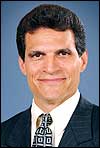
Unlocking the Door to Learning
 Linda Simmons Hight |
 Tom Paquette |
||
| “Quality education is within the grasp of everyone — without drugs.” |
 Thomas G. Whittle |
||
His smile would broaden as the temperature plunged 20 to 30 degrees or more and students roused from their slumbers.
Later, in an Army classroom, after a number of fellow lieutenants were caught dozing, word circulated that such behavior would be dealt with severely in the future, with career-jeopardizing punishment threatened. We managed to keep one another awake after that with sharp but artfully concealed jabs.
Knowing then what I do now, I would have advised instructors and students alike of a simple, effective solution to study difficulties. As described in this Freedom edition, this solution does far more than empower students to stay awake, unlocking as it does the door to successful learning in any field. It is simple, workable and growing exponentially in schools, colleges, businesses and homes throughout the nation and the world.
The need for such a technology has never been greater.
The Department of Labor, for example, calculates that illiteracy costs American businesses some $225 billion a year in lost productivity and other ways. Despite ever-increasing educational expenditures, it is estimated that 50 million Americans cannot read or comprehend above the 8th-grade level.
Every child has an inalienable right to an education, guaranteed around the globe by the Universal Declaration of Human Rights, which mandates that education shall be directed to the full development of the human personality.
This concept is woven into the fabric of America’s freedom at least as far back as the Declaration of Independence, which held it to be “self-evident, that all men are created equal, that they are endowed by their Creator with certain unalienable Rights, that among these are Life, Liberty and the pursuit of Happiness.”
Certainly, if one doesn’t know how to study or learn, the doors of opportunity can slam shut, with one’s pursuit of happiness ruined or at least restricted.
In this regard, Secretary of Education Roderick Paige recently called upon all Americans to help. “The education of every child affects all of us as parents, neighbors, employers and citizens,” he said. “If we do not reach out to help every child to succeed with his or her education, then we are determined as a society not to succeed as well.”
For our country to succeed as Dr. Paige envisions, we must, as he noted, surround future generations with superlative educators and mentors, so no child is left behind.
Essential to such success is the recognition that methods and solutions devised by certain “experts” have failed utterly, as covered in this issue. Those methods have led to, among other problems, as many as 9 million American schoolchildren on dangerous and sometimes deadly psychiatric drugs.
With this issue, we hope to make our readers aware of how quality education is within the grasp of everyone — without drugs.
— Thomas G. Whittle
|
Get the Latest on the Net
|

